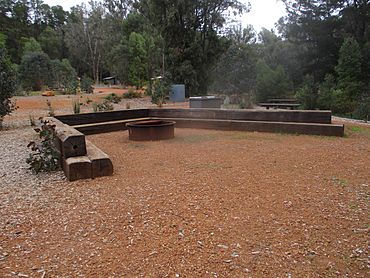Nanga Brook, Western Australia facts for kids
Quick facts for kids Nanga BrookWestern Australia |
|||||||||||||||
|---|---|---|---|---|---|---|---|---|---|---|---|---|---|---|---|

Facilities in the Lane Poole Reserve at the former town site
|
|||||||||||||||
| Established | 1902 | ||||||||||||||
| Postcode(s) | 6215 | ||||||||||||||
| Elevation | 265 m (869 ft) | ||||||||||||||
| Area | [convert: needs a number] | ||||||||||||||
| Location |
|
||||||||||||||
| LGA(s) | Shire of Waroona | ||||||||||||||
| State electorate(s) | Murray-Wellington | ||||||||||||||
| Federal Division(s) | Canning | ||||||||||||||
|
|||||||||||||||
Nanga Brook is a place in Western Australia. It used to be a busy town. Today, it's part of the beautiful Lane Poole Reserve. You can find it between the towns of Dwellingup and Waroona.
Contents
The Story of Nanga Brook
Early Days and the Big Mill
Nanga Brook was once a busy town where people worked with timber. Timber was first taken from this area around 1898. In 1902, a company called Millars Karri & Jarrah Company got permission to set up a timber mill here.
The Nanga Mill became the biggest timber mill in the area. For many years, it employed over 100 men. In 1909, Millars built a whole town for its workers. It had 56 homes, a store, a butcher shop, a hall, a billiard room, and a school. Later, they even added three tennis courts and a sports oval for fun.
Challenges and Changes
Big world events affected the mill. During the two World Wars, many workers left to fight overseas. The Great Depression, a time when jobs were scarce and money was tight, also caused many workers to leave. Their wages were not enough to buy food and other important things.
In 1941, the original Nanga Mill sadly burned down. A new, smaller mill was built, but it only needed about 16 workers. At this time, Nanga Brook was already struggling. It couldn't compete with the larger mill in nearby Dwellingup.
The End of the Town
In January and February 1961, huge bushfires swept through Western Australia. These fires completely destroyed the town of Nanga Brook and devastated the surrounding countryside.
Many charities, like the Australian Red Cross, helped the workers and their families. People from all over Australia donated money to help them rebuild their lives. However, there was no reason for the families to return to Nanga Brook. In 1962, the town was officially closed down.
After the fires, the area was replanted with pine trees. The Forests Department, which is now called the Department of Parks and Wildlife, turned the area into a popular spot for camping and picnics.
Nanga Brook Today
Exploring Lane Poole Reserve
Today, Nanga Brook is part of the Lane Poole Reserve. This large forest reserve covers about 55,000 hectares (about 135,900 acres). It is named after Charles Lane Poole, who was Australia's first Inspector-General of Forests.
The reserve is home to many types of trees, including jarrah, wandoo, marri, and blackbutt. It was created in 1984 by combining six smaller reserves.
Fun Along the Murray River
The most popular parts of the reserve are near the Murray River. This river is special because it's one of the few rivers in this part of Western Australia that hasn't been dammed. You can find natural waterfalls and rock pools along its path.
Many people enjoy camping in the reserve. Some of the most popular campsites are Baden Powell, Nanga Mill, Stringers, and Charlie's Flat. There's also the Icy Creek Environmental Education Camp, which offers places for students and community groups to stay.
Most of the roads in the reserve are not paved. Park managers are working to improve roads and address other issues. These include people camping in non-designated spots, visitor behavior, safety, dogs in the reserve, and collecting firewood.
 | Percy Lavon Julian |
 | Katherine Johnson |
 | George Washington Carver |
 | Annie Easley |

